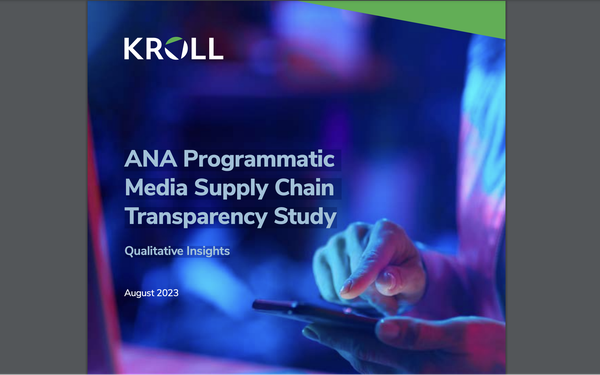ANA's Kroll Analysis: Advertisers Paying Twice For Some Programmatic Fees
- by Joe Mandese @mp_joemandese, August 3, 2023

Advertisers have long known that they pay a programmatic ad “tax” vis a vis numerous surcharges and fees added by ad tech suppliers before their buys are actually completed, but a new report released this week asserts they sometimes are paying twice for them.
“Our study found that advertisers were often unaware of this,” financial advisory service Kroll writes in “ANA Programmatic Media Supply Chain Transparency Study: Qualitative Insights,” a follow up to the June 19 release of the Association of National Advertisers’ blockbuster “Programmatic Media Supply Chain Transparency Study.”
Specifically, Kroll found that in many instances advertisers are redundantly paying third-party services to verify their ads in programmatic advertising buys, even though the supply-side platforms (SSPs) typically already provide third-party ad verification as part of their exchange.
advertisement
advertisement
“In the words of an SSP tech lead, ‘SSP pays for it—substantial fee from them to measurement company, ultimately charged to the marketer. Cost to marketer would be lower if SSP didn’t need to pay verifier,’” the Kroll report explains.
While Kroll’s qualitative analysis doesn’t put a quantitative number on the amount of programmatic ad spending wasted on such redundancies, the ANA report estimates their is about $20 billion in overall waste associated with the programmatic supply chain.
The ANA plans to release a second report from its programmatic supply chain study later this year, which may shed more quantitative light on the amount of waste attributed to redundant ad tech payments.
Meanwhile, Kroll’s analysis should spark some interest – and questions – about “thus paying twice” for services like programmatic ad verification.
“This not only adds an unnecessary cost, but it can also cause the ad to be ‘heavy’ and therefore slower to deliver,” the Kroll report adds, noting, “This is because ad verification is accomplished by placing a macro within the ad serving tag that collects information about where the ad is running (e.g., a website, geography). The more macros within a tag, the longer it can take for the ad to serve on the website. It is possible that a campaign might benefit from redundant verification, but advertisers should know whether such redundancies exist, how much they are adding to the overall cost, and whether the benefit of doing so outweighs that cost.”



Kroll is verifying what we've always known had to be the case. There is nothing nefarious happening, just a lack of oversight by marketers. Greater transactional transparency will allow SPO and contractual arrangements that eliminate such duplicative costs.
Shameless plug: TAG TrustNet helps solve this challenge for marketers. We are already saving partner brands millions in waste and inefficiencies.
this from Zaneis "Kroll is verifying what we've always known had to be the case. There is nothing nefarious happening" is such ignorant BS, it's almost unbelievable.
Kroll surveyed 33 people and "found"...
"that in many instances advertisers are redundantly paying third-party services to verify their ads in programmatic advertising buys, even though the supply-side platforms (SSPs) typically already provide third-party ad verification as part of their exchange."
advertisers paid for verification twice, sometimes three times over, and the verification tech doesn't even work for most forms of fraud; they are tuned for looking for invalid traffic/bots.
see the whistleblower testimony slide in the article.
Legacy Fraud Verification Vendors Are No Longer Fit for Purpose
https://www.linkedin.com/pulse/legacy-fraud-verification-vendors-longer-fit-purpose-fou/
Shameless Plug? try Shameless Industry.